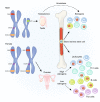Inflaming sex differences in mood disorders
- PMID: 29955150
- PMCID: PMC6235877
- DOI: 10.1038/s41386-018-0124-7
Inflaming sex differences in mood disorders
Abstract
Men and women often experience different symptoms or rates of occurrence for a variety of mood disorders. Many of the symptoms of mood disorders overlap with autoimmune disorders, which also have a higher prevalence in women. There is a growing interest in exploring the immune system to provide biomarkers for diagnosis of mood disorders, along with new targets for developing treatments. This review examines known sex differences in the immune system and their relationship to mood disorders. We focus on immune alterations associated with unipolar depression, bipolar depression, and anxiety disorders. We describe work from both basic and clinical research examining potential immune mechanisms thought to contribute to stress susceptibility and associated mood disorders. We propose that sex and age are important, intertwined factors that need to be included in future experimental designs if we are going to harness the power of the immune system to develop a new wave of treatments for mood disorders.
Conflict of interest statement
There are no competing interests in relation to the work described in the manuscript.
Figures


Similar articles
-
Stress, sex hormones, inflammation, and major depressive disorder: Extending Social Signal Transduction Theory of Depression to account for sex differences in mood disorders.Psychopharmacology (Berl). 2019 Oct;236(10):3063-3079. doi: 10.1007/s00213-019-05326-9. Epub 2019 Jul 29. Psychopharmacology (Berl). 2019. PMID: 31359117 Free PMC article. Review.
-
Deciphering sex differences in the immune system and depression.Front Neuroendocrinol. 2018 Jul;50:67-90. doi: 10.1016/j.yfrne.2017.12.004. Epub 2017 Dec 27. Front Neuroendocrinol. 2018. PMID: 29288680 Review.
-
Stress-induced disturbances along the gut microbiota-immune-brain axis and implications for mental health: Does sex matter?Front Neuroendocrinol. 2019 Jul;54:100772. doi: 10.1016/j.yfrne.2019.100772. Epub 2019 Jul 11. Front Neuroendocrinol. 2019. PMID: 31302116 Review.
-
Mood episodes and mood disorders: patterns of incidence and conversion in the first three decades of life.Bipolar Disord. 2009 Sep;11(6):637-49. doi: 10.1111/j.1399-5618.2009.00738.x. Bipolar Disord. 2009. PMID: 19689506 Free PMC article.
-
Role of neuro-immunological factors in the pathophysiology of mood disorders.Psychopharmacology (Berl). 2016 May;233(9):1623-36. doi: 10.1007/s00213-016-4214-0. Epub 2016 Jan 23. Psychopharmacology (Berl). 2016. PMID: 26803500 Review.
Cited by
-
Why Are Some People with Lower Urinary Tract Symptoms (LUTS) Depressed? New Evidence That Peripheral Inflammation in the Bladder Causes Central Inflammation and Mood Disorders.Int J Mol Sci. 2023 Feb 1;24(3):2821. doi: 10.3390/ijms24032821. Int J Mol Sci. 2023. PMID: 36769140 Free PMC article. Review.
-
Family-based analyses reveal novel genetic overlap between cytokine interleukin-8 and risk for suicide attempt.Brain Behav Immun. 2019 Aug;80:292-299. doi: 10.1016/j.bbi.2019.04.004. Epub 2019 Apr 3. Brain Behav Immun. 2019. PMID: 30953777 Free PMC article.
-
Trajectories of Inflammatory Markers and Post-COVID-19 Cognitive Symptoms: A Secondary Analysis of the CONTAIN COVID-19 Randomized Trial.Neurol Neuroimmunol Neuroinflamm. 2024 May;11(3):e200227. doi: 10.1212/NXI.0000000000200227. Epub 2024 Apr 16. Neurol Neuroimmunol Neuroinflamm. 2024. PMID: 38626359 Free PMC article. Clinical Trial.
-
Sex Differences in the Inflammatory Consequences of Stress: Implications for Pharmacotherapy.J Pharmacol Exp Ther. 2020 Oct;375(1):161-174. doi: 10.1124/jpet.120.266205. Epub 2020 Aug 5. J Pharmacol Exp Ther. 2020. PMID: 32759370 Free PMC article. Review.
-
Enduring and Sex-specific Changes in Hippocampal Gene Expression after a Subchronic Immune Challenge.Neuroscience. 2020 Jan 21;428:76-89. doi: 10.1016/j.neuroscience.2019.12.019. Epub 2020 Jan 7. Neuroscience. 2020. PMID: 31917350 Free PMC article.
References
-
- Zucker I, Beery AK. Males still dominate animal studies. Nature. 2010;465:690. - PubMed
-
- Abdi F, Mobedi H, Mosaffa N, Dolatian M, Ramezani Tehrani F. Effects of hormone replacement therapy on immunological factors in the postmenopausal period. Climacteric. 2016;19:234. - PubMed
-
- Paganelli R, Iorio ADi, Cherubini A, Lauretani F, Mussi C, Volpato S, et al. Frailty of older age: the role of the endocrine - immune interaction. Curr Pharm Des. 2006;12:3147–59. - PubMed
Publication types
MeSH terms
Grants and funding
LinkOut - more resources
Full Text Sources
Other Literature Sources
Medical

